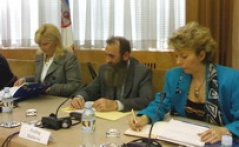National Assembly of the Republic of Serbia / Activities / Activity details

Friday, 10 November 2006
European Commission gives favourable assessment of National Assembly
The Chairman of the National Assembly of the Republic of Serbia, Predrag Markovic, today attended the plenary meeting of the Enhanced Permanent Dialogue (EPD) between Serbia and the European Union.
The Chairman of the National Assembly of the Republic of Serbia, Predrag Markovic, today attended the plenary meeting of the Enhanced Permanent Dialogue (EPD) between Serbia and the European Union.
Addressing the attendants, Markovic expressed his pleasure at the fact that, as of this day, Serbia had a new Constitution. The adoption of the Constitutional Act created preconditions for the implementation of the new Serbian Constitution, adopted unanimously by the National Assembly at its First Special Sitting, held on 30 September 2006, confirmed by popular vote on 28 and 29 October, and ceremonially proclaimed by the National Assembly on 8 November 2006. He reiterated that he had presented a detailed report, as early as 26 July 2006, at the last EPD meeting, on the course of activities undertaken in amending the old Constitution. The report contained a ‘detailed clarification of the process, and a warning of the difficulties faced, but also an announcement that everything would be done to achieve consensus and have the new Constitution adopted as quickly as possible.’ After the the unanimous adoption of the proposed Constitution by the National Assembly (described by Markovic as ‘nothing short of a political miracle’), the Assembly Chairman said he had written to the head of the European Commission’s Delegation to Serbia, Josep Lloveras, to inform him of the process of adopting the new Constitution and the creation of democratic and legal preconditions for full constitutional reform. Markovic underlined that the fact that the level of human and minority rights achieved so far could not be changed was ‘an important achievement for further democratisation of society.’
Referring to the European Commission’s report on the progress made by Serbia in 2006, especially the section dealing with the National Assembly, Mr Markovic underlined that the detailed, positive assessment of the Assembly’s progress was ‘personally flattering’, but ‘posed challenges for the future to the Assembly, a key institution that must overcome problems identified.’
The European Union had prepared, and published, on 8 November, its annual Serbia Progress Report, which positively assessed activities of the National Assembly of the Republic of Serbia.
The part of the report dealing with the National Assembly says that ‘[t]he Serbian Parliament has continued with intensive legislative activity’, and goes on to underline the amendment of the Rules of Procedure ‘to take over the competencies of the State Union Parliament, especially control of the military and international parliamentary cooperation.’ The Assembly’s activities in 2006 were assessed as ‘transparent and open to the general public’, while the timely publication of comprehensive National Assembly Bulletins (under the Act on Free Access to Information of Public Importance) is also stressed; ‘[t]he practice of publishing regular three-monthly reports’ also receives praise, as did the Chairman’s practice of continuing ‘to brief the media and the international partners regularly’. The European Commission also praised the work of Assembly Committees: it hailed the formation of the Local Self-Government Committee, while the European Integrations Committee, the report says, ‘continued its good work to implement the European Partnership.’ The formation of the Legislation Harmonisation Division (LHD), tasked with bringing Serbia’s legislation in line with EU law, is seen as a positive development, although the report does note that ‘the activities of this Office [the LHD] are still at an early stage.’
The European Commission’s report goes on to emphasise that the Assembly ‘still lacks specialised staff’, that it ‘has often set too short periods of vacatio legis for new pieces of legislation’, that the Ombudsman had not yet been elected, although the necessary legislation was adopted as early as 2005, as well as that there were ‘a number of outstanding issues concerning election monitoring, updating of voters’ registers and financing of election campaigns.’
The section on the work of the National Assembly in 2006 ends with the conclusion that ‘there is scope for further improvement especially on the basis of the recently amended parliamentary procedures.’

